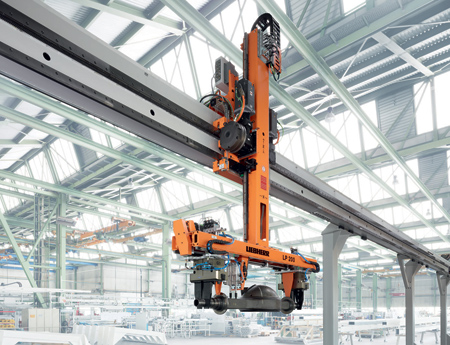
The LP gantry robot can be built with a wider clearance between uprights.
Liebherr's LP 200 gantry robot is particularly suitable for handling smaller and lighter components. Its flexible design makes it dovetail well with inline production concepts, where workpieces have to cover larger distances. This LP 200 offers engine and gearbox manufacturers many more options, enabling them to find their own optimum solutions.
It is suitable for use in the weight category including cylinder heads and gearbox housings as well as alternative drivetrain units, like electric or hybrid engines, fuel cells or components of a similar size. The option of configuring the gantry to deliver high-speed or high-load performance is new. The payload for the LP 200 range of three gantries is 300-600 kg. Each gantry provides repeatable accuracy in each axis of +/- 0.1 mm.
Ideal for Inline Production
"Today, the 'inline concept,' featuring long travel ways, dominates production lines. Loading gantries handle transportation of workpieces as well as loading and unloading of machines. Conveyor belt systems for the transportation of workpieces are now only required to a lesser extent. Furthermore, the number of machines covered by a single loading gantry is increasing in order to increase production capacity at minimized use of automation systems," said a company spokesperson.
"Changes in the line design have consequences for the automation system: workpieces must cover greater distances at higher speeds. The fact that machinery and machining centers are constantly getting faster is also putting pressure on cycle times," added the spokesperson.
Central tasks of an automation software include the acquisition of operating data, production planning, parts tracking and an information system. These modules are available with the new Liebherr Manufacturing System 4.0 (LMS 4.0). They can be added to a basic package, forming the foundation of all modules. "This means that every customer gets the right software solution for their automation system," said the spokesperson. A new graphically guided interface concentrates functions in a user-friendly manner on the host computer, and if required allows full control of production. Furthermore, there are interfaces to the most common ERP systems.
For the LMS 4.0 Part Tracking Application module, the workpieces need clear identification codes, such as bar codes or matrix codes. Scanners must be installed at every station to continuously register the processing steps and the status of the parts. The LMS 4.0 Production Scheduler can set up production assignments statically or dynamically according to the final deadline. External assignments - for example from SAP - can also be imported, which gives the user flexibility when planning and managing their assignments.
The LMS 4.0 Production Monitoring Application is used for data acquisition. It gathers operating data and statuses of the individual stations and their availability. In addition, it also counts the workpieces and displays error messages. If this module is installed, users can also use the LMS 4.0 Info Board module. This visualizes the production cell: production and operating data can be called up on a large monitor, taking current or historic data (including target specifications) into account. For example, the Info Board means that the user always has an eye on whether the cells are active and whether the target specifications are being fulfilled.
Liebherr offers a range of automation systems that enable modern high-efficiency production. The emphasis here is on economy, ease of use, quality and reliability in combination with a high degree of flexibility. The production range comprises gantry robots, conveying systems, storage systems, pallet handling systems and robot integration.
For more information contact:
Liebherr Gear Technology, Inc.
1465 Woodland Drive
Saline, MI 48176-1259
734-429-7225
info.lgt@liebherr.com
www.liebherr.com